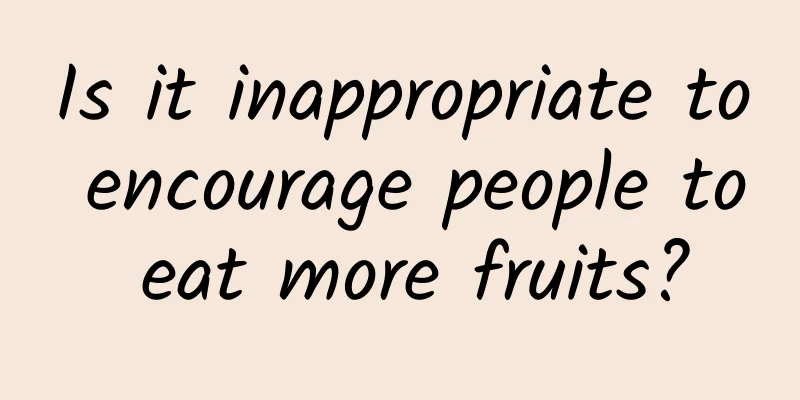Is it inappropriate to encourage people to eat more fruits?

|
"Eat more fruits and vegetables", what a familiar voice. We are used to and agree with "eat more fruits and vegetables", which seems to be the truth, without question or doubt. I have no objection to advocating eating more vegetables, but unfortunately many people do not like to eat them and do not eat more, so I will not discuss this in this article. Advocating eating more fruits, without self-discipline and moderation, is exactly what the public wants, but unfortunately it is questionable, so this article will throw out some ideas. There is a reason why "eating more fruits and vegetables" is popular. The "Dietary Guidelines for Chinese Residents" has been published in five editions. Except for the first edition in 1989, the other four editions have proposed the suggestion of "eating more fruits and vegetables". The latest version is the "Dietary Guidelines for Chinese Residents (2022)". The third of its eight principles of balanced diet is "eat more fruits and vegetables, milk, whole grains, and soy". The specific suggestion for fruits is "eat fruits every day, and ensure that you consume 200-350g of fresh fruits every day. Juice cannot replace fresh fruits." First, let me show you the many benefits of fruit. Fruit not only provides abundant minerals, vitamins, water, glucose, fructose, sucrose and dietary fiber, but also contains trace amounts of phytochemicals, such as flavonoids, carotenoids, polyphenols, lycopene, proanthocyanidins and anthocyanidins, etc., which may have exciting effects such as anti-cancer, anti-oxidation, immune regulation, and cholesterol-lowering, as well as some yet-to-be-defined, perhaps magical effects. Now is the era of fruit freedom. Do we need to reflect? For ordinary people, financial freedom may be difficult to achieve in a lifetime, but food freedom has been achieved, including fruit freedom. At the same time, in order to cater to people's tastes, with the blessing of modern agricultural technology, fruits are becoming sweeter and less sour, with less dietary fiber and higher sugar content (sweetness and sugar content are not always proportional). In short, fruits are becoming more and more delicious and more affordable, and as a result, people eat more and more. In this situation, can we still advocate "eating more fruits"? The problem of excess energy is simple and intuitive, and you will understand it at a glance. A few types of vegetables are both fruits, such as cucumbers, tomatoes, and cherry tomatoes. They have very low energy and are not a concern. Most other fruits have high energy. If you eat them freely, you may easily get excessive energy intake, which will lead to obesity, high blood sugar and high cholesterol. Typical examples include: bananas, winter dates, plantains, durian, jackfruits, avocados, coconuts and other fruits. If you look up the nutritional composition table, you will find that the same amount of fruit (edible part) and rice (dry rice) have the same energy or even more than rice, not to mention dried fruits. With such high energy, do you still dare to eat more? The particularity of fructose is complex but important and requires patience. In natural foods, fructose is mainly found in fruits and honey. Fructose and glucose have the same molecular formula and are isomers of each other; however, the metabolism of fructose is very different from that of glucose. Glucose tends to be directly converted into "cellular energy" - ATP, or into "emergency reserves" - glycogen; fructose tends to be converted into "strategic reserves" - fat, or into "emergency reserves" - glycogen; especially when glucose is not scarce, fructose is more likely to be converted into fat. Fruits and honey usually contain half glucose and half fructose. When eating fruit, the body does not lack glucose, so fructose is likely to become fat. In the era of food scarcity, fructose was converted into glycogen and fat to store energy in preparation for famine and increase the chance of survival, which was a masterpiece of genetic design. However, now that food is free, it has become a burden. Fructose increases the risk of metabolic syndrome and is positively correlated with obesity, dyslipidemia, non-alcoholic fatty liver disease, hyperuricemia, insulin resistance and the incidence of some tumors. Fructose metabolism does not increase blood sugar, does not depend on insulin, and does not secrete satiety factors and leptin. As a result, the feeling of fullness is not strong, which is what we often say "fruits are not filling" and we eat too much without realizing it. Sugary sweets are addictive and are known as "sweet killers." Sweets stimulate the brain to secrete a large amount of dopamine, which produces a feeling of satisfaction and pleasure, driving people to continue eating, so people keep eating fruits. Fructose is the sweetest natural sugar, about 1.7 times sweeter than sucrose, and has a refreshing sweetness, making fruits more attractive to people. Sweets, whether artificial desserts, such as added sugar, candy, ice cream, milk tea, or natural desserts, such as various sweet fruits and honey, are naturally liked by humans. There is no need for acquired cultivation, and they come from the original genetic design. There is a difference between using fruits to make fresh juice and using fruits, and it may be a bit bad. The main reasons are: 1. Drinking fresh juice often discards the fruit residue - precious dietary fiber; 2. Fresh juice made from fruits is too delicious and too easy to consume in excess; 3. Ingesting a large amount of fructose in a short period of time is too easy to convert into fat. Commercially available fruit juice products should be consumed with caution. Due to the need for processing, cost, appearance and sensory perception, dietary fiber and VitC are greatly reduced, and a large amount of added sugar is added, which is close to sugary drinks, which is even worse. Canned fruit is in a similar situation and is not recommended. We eat fruits now, not for the minerals, vitamins, water, glucose, fructose, and sucrose in them, which we generally have in abundance. Even if we do, we should first get them from vegetables with low energy density, right? We eat fruits because they are delicious and irresistible! Of course, the high-quality dietary fiber and water-soluble pectin in fruits are good things, which is a reason. How to eat fruit? Eat carefully and selectively. Try to avoid fruits with high energy (Kcal), high carbohydrates, high glycemic index (GI), and high glycemic load (GL). At the same time, choose fruits with high dietary fiber. Is this acceptable? |
<<: How to make the most delicious amaranth? It's not mixed with dried tofu
>>: How come the foot is turned outward? Girls, don't tolerate this anymore.
Recommend
Yelp: Using social marketing to beat traditional review sites
On November 17, 2011, Eastern Time, Yelp submitte...
Is it easy to get pregnant with one fallopian tube?
I believe everyone knows that the female reproduc...
Signs of pregnancy earlier than menopause
Many women who have just started to get pregnant ...
Is it correct to step on the brake and the accelerator at an angle when driving? How should you step on the brake and the accelerator?
Many people ask how to step on the brakes and acc...
How to suppress uterine contractions during pregnancy
Many pregnant women will experience uterine contr...
What can't you eat if you have uterine cyst?
Uterine cysts require dietary restrictions, other...
Can I have a baby at 40?
In modern society, there are many older women who...
RBC: I can work overtime, but please be nice to me.
Mixed Health I don't understand the health tr...
How can you find your way when you are lost in the wild? How can you make a fire in the wild?
There are quite a few people whose hobbies are ou...
The reason why leucorrhea increases in cold weather
We all know that leucorrhea is a white secretion ...
What medicine should I take for gynecological inflammation and bleeding
Gynecological inflammation is prone to bleeding d...
What does county-run school recruitment mean? Will county-run school recruitment be implemented nationwide in 2020?
After the late reform, teachers are under the uni...
How to apply eye makeup for droopy eyelids to make eyes more vivid
Eyes have a great influence on a person's fac...



![[Medical Q&A] What is premature ovarian failure?](/upload/images/67f0f316d771f.webp)





